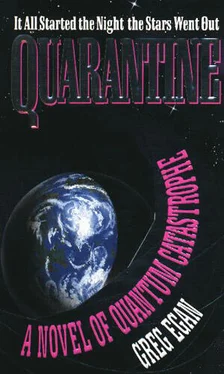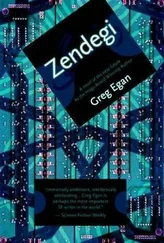Lee Hing-cheung takes over. I sit in the train home, staring at the other passengers, daring this contrived vision to decay into surreal anarchy. But the carriage remains solid, the people stare back at me coolly, the stations appear through the windows in just the right order, at just the right times. It's hard to believe that there's room for so much clockwork in my head.
By the time I'm home, every hint of doubt has evaporated. I'm not hallucinating anything — or at least, no more than usual. As I lie in bed listening to the familiar street sounds, the mundanity of the world enfolds me, more comforting — and more strange — than ever before. I stare up at the ceiling, and every crack in the plaster, every patch of sunlight, seems patient beyond comprehension, a miracle of endurance defying belief. I could keep watch for a billion years, waiting for some sign of the underlying truth to reveal itself, and still be spared. How can I call this feat an illusion, a lie?
The light dims, and there's a sudden burst of rain against the window. And for a moment I wonder: which did we really create? The unique, solid, macroscopic world of experience? Or the multi-valued, smeared, quantum world that seems to underpin it? Po-kwai believes that our ancestors collapsed the universe … but if the reverse were true — if the twentieth-century creators of quantum mechanics didn't so much discover the laws of the microscopic world, as bring them into being — would we even know the difference? Is it any harder to believe that the human brain might have manufactured the quantum world from the classical, than it is to believe the opposite? And with all our — inescapably — anthropocen-tric experiments, can we ever hope to discover the objective, inhuman truth?
Maybe not. But I still know which trait seems most human to me.
A crowd of children on their way to school, caught in the rain on the street below, start squealing. I choose sleep.
I arm myself with a dozen excuses before setting out to challenge ASR's security by leaving the thirtieth floor. There's no need for explanations, though; the two guards at the security station avert their eyes as I pass, a perfectly choreographed moment that leaves me wanting to laugh with delight — or sink gibbering to the floor at this final proof of my complete derangement. Instead, I close my eyes for a moment and tell myself, unconvincingly, that it's no stranger than one hundred consecutive snake's eyes.
I decide to take the stairs rather than the elevator; both are monitored, but it strikes me that the elevator might 'link' me with anyone whose passage through the building is affected in some way by my use of it.
I decide to take the stairs? Maybe I have no choice in the matter; maybe every last detail of my thoughts and actions has been, or will be, selected by my smeared self. But the illusion of free will remains as compelling as ever, and I can't (literally can't?) help thinking that the choice was mine.
I descend to the sixth floor, which is meant to be completely sealed off at this hour — but the door from the stairway behaves precisely as if it were unlocked. The security station is unmanned, and heavy steel shutters block the way; they begin to glide apart before I even glance at the control box — which ought to require two magnetic keys, and central authorization.
I step through, giddy for a moment with a mixture of megalomania and paranoia; I really don't know whether to feel empowered, or manipulated. I'm not doing any of this… and yet, there's no doubt that it is exactly what I want. From the very first dice trick, my smeared self has done my bidding. Clearly, all my fears of mutiny were unfounded; those early mod failures, those visions of Karen, must have been nothing but an aberration. And that's hardly surprising: I had no — conscious — idea what I was doing, so no wonder I had no control.
Every lab, every storeroom, is open to me. I wander from room to room at random, heedless of locks and cameras — at first, fighting a growing sense of unreality, but then willingly succumbing to it. I don't believe for a moment that I'm literally dreaming, but it's easier to let this dreamlike mood overtake me than to keep up the battle between ingrained common sense and the elaborate, intellectual reasons why all of these bizarre miracles are permitted in the waking world. Lui was right: the challenge — for me — isn't operating the mod, but finding ways to stay sane while it happens.
And it is a lot like dreaming. Doors open because they should open; I remain undetected because the logic of the dream demands it. And like any dream protagonist, I can't expect free will, I don't presume to be in control. In Room 6191 hesitate, and idly wish for the chair beside the main console to levitate, or slide across the floor towards me — but I'm not at all surprised when it does neither. Not because I doubt that it's possible; just because it wouldn't be right.
I know, in the manner of dreams, when it's time to leave the sixth floor and trudge back up the twenty-four flights of stairs. The exertion this requires is scrupulously realistic, and my numbness gradually clears — enough to let me grow anxious again. All those doors, all those locks, all that surveillance hardware … multiplying out the probabilities makes the whole exercise seem dangerously fragile and precarious.
I baulk at the exit to the thirtieth floor, afraid that these doubts might rebound on me-that I might be punished for my lack of faith. I wait for my breathing to grow quieter, knowing how absurd that is, but pandering to my obsolete instincts for the sake of peace of mind.
Finally, I steel myself and open the door — one more casual miracle to prove that all is well, or one more improbability piled upon a tottering edifice — and step through.
The guards contrive not to see me, as efficiently as before (and I think I have problems with free will). I walk through the checkpoint with my eyes straight ahead, and turn the corner without looking back. The moment I'm out of their (potential) sight, I very nearly collapse — desperate to set the night's events in concrete, to make my impossible luck indisputably, irreversibly real — but as the Hypernova menu pops into my mind's eye, I recall that I'm still in the field of view of at least two cameras.
As a gesture to normality, I open the door to the anteroom in the ordinary way: with a coded RedNet pulse, a thumbprint and a magnetic key. Then I wonder — too late — if this authorized event is more likely to be logged in the building's security computer than all the illicit entries that I know went unnoticed. I slam the door behind me, muttering, 'I'm getting sloppy. I've got to take more care.'
Po-kwai laughs. 'I wouldn't say that. But I was surprised when I found you weren't here.' She frowns. 'What's wrong?'
I shake my head. 'Nothing. I thought I heard an intruder. It was a false alarm, though; there's nothing to worry about.'
'An intruder? Where?'
'Out in the corridor.'
'But aren't there cameras? How could anyone…?'
I shrug. 'Hardware can be undermined. In theory. But forget it, there was nobody there.'
'You look like you raced this "nobody" to the roof and back.'
I realize I'm visibly sweating, and it's not from climbing the stairs. I wipe my forehead apologetically. 'I did check the staircase, a few levels up and down. I must be getting out of condition.'
'I'm surprised your mods actually allow you to perspire.'
I laugh weakly. 'It'd be very dangerous not to. Appetite suppression is one thing, but screwing up thermoregulation would be … suicidal.'
She nods, and says nothing. She seems more baffled than suspicious; if she doubts my story, I expect she thinks that I've played down the incident, not invented it. I try to think of a way to keep her from innocently asking Lee Hing-cheung about last night's excitement, but nothing comes to mind. Don't tell anyone about this, because … what? Because I don't want to seem like an idiot, chasing phantoms? She knows that the guards at the checkpoint 'must' have seen me.
Читать дальше










